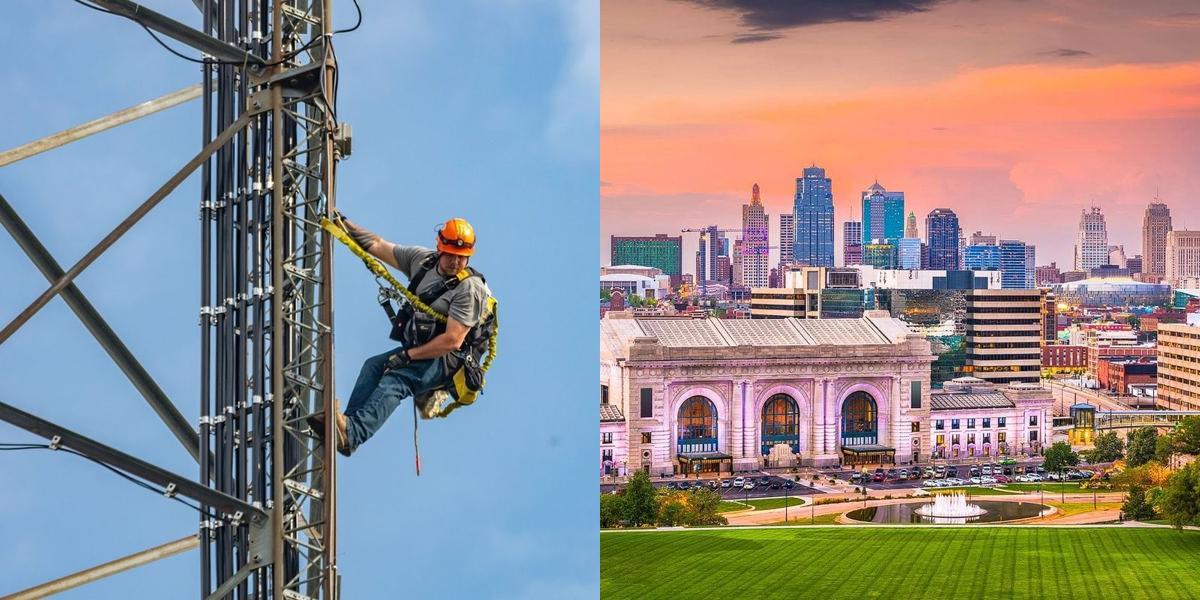How to Become a Tower Technician in Missouri

Tower technicians, also known as tower climbers, are professionals who specialize in the installation, maintenance, and repair of communication towers and antennas. They ensure the proper functioning of cellular networks, radio systems, and other communication devices.
How do I get a job as a Tower Technician?
Once you have obtained your Tower Technician certification, you will be ready to start your career as a Tower Technician. There are several steps you can take to increase your chances of finding a job in this field.
First, make sure to update your resume to highlight your certification and any relevant experience or skills you have acquired. Include any internships, volunteer work, or part-time jobs that are related to the field. Emphasize your ability to work at heights, your knowledge of tower safety procedures, and your technical skills.
Next, start networking within the industry. Attend job fairs, industry conferences, and other events where you can meet potential employers and make connections. Join professional organizations such as NATE or TIA, and consider becoming a member of online communities and forums for Tower Technicians. These can be great places to find job leads and get advice from experienced professionals.
You can also search for job openings on online job boards, industry websites, and company websites. Many companies that hire Tower Technicians will post job listings on these platforms. Be sure to tailor your application materials to each job you apply for, highlighting the specific skills and qualifications that are required.
Consider reaching out to companies directly, even if they don't have current job openings. Sometimes companies are not actively hiring, but they may keep your resume on file for future reference. This can be a great way to get your foot in the door and show your enthusiasm and dedication to the field.
Finally, be prepared for the interview process. Research the company you are applying to and familiarize yourself with their work and projects. Practice your interview skills and be ready to answer questions about your technical knowledge, problem-solving abilities, and ability to work in a team. Highlight your certification and any relevant experience you have.
Career Paths and Opportunities after Becoming a Tower Technician
Becoming a Tower Technician can open up a range of career paths and opportunities. Here are a few options to consider:
-
Tower Climber: As a Tower Climber, you will be responsible for climbing towers to install, maintain, and repair communication equipment. This is the most common career path for Tower Technicians, and it offers opportunities for advancement and specialization.
-
Tower Foreman: After gaining experience as a Tower Climber, you may have the opportunity to become a Tower Foreman. In this role, you will be responsible for overseeing a team of Tower Technicians, coordinating projects, and ensuring that work is completed safely and efficiently.
-
Tower Inspector: Tower Inspectors are responsible for conducting regular inspections of communication towers to ensure that they are structurally sound and in compliance with industry standards. This role requires a deep understanding of tower safety and structural engineering principles.
-
Tower Project Manager: As a Tower Project Manager, you will be responsible for overseeing all aspects of tower projects, from planning and budgeting to execution and completion. This role requires strong leadership and organizational skills, as well as a thorough understanding of tower construction and maintenance.
-
Telecommunications Technician: While Tower Technicians primarily work on communication towers, their skills and knowledge are also applicable to other areas of the telecommunications industry. As a Telecommunications Technician, you may work on a wide range of projects, including the installation and maintenance of equipment in buildings, data centers, and other locations.
-
Training and Education: Once you have gained significant experience and expertise as a Tower Technician, you may have the opportunity to teach and train others in the field. This can be a rewarding career path that allows you to share your knowledge and help develop the next generation of Tower Technicians.
The demand for Tower Technicians is expected to grow in the coming years, as the need for reliable and efficient communication networks continues to increase. This means that there will be plenty of opportunities for skilled and certified Tower Technicians to find employment and advance in their careers.
Final Thoughts
Becoming a Tower Technician can be a challenging yet rewarding career choice. By completing a training program and obtaining certification, you will have the necessary skills and knowledge to work safely and effectively on communication towers.
To increase your chances of finding a job as a Tower Technician, make sure to update your resume, network within the industry, and actively search for job openings. Consider reaching out to companies directly, even if they don't have current openings, and be prepared for the interview process.
Once you have started your career as a Tower Technician, there are several career paths and opportunities to consider, including becoming a Tower Climber, Tower Foreman, Tower Inspector, Tower Project Manager, Telecommunications Technician, or even a trainer or educator in the field.
The demand for Tower Technicians is expected to continue growing, making it a promising field for those who are willing to put in the time and effort to obtain the necessary skills and certifications. Good luck on your journey to becoming a Tower Technician!
Dreambound has you covered with a series of detailed guides, each designed for a different city. And if you're elsewhere or considering a move, we've got more guides that might fit your needs.
- Tower Tech classes near me in Albany
- Tower Tech classes near me in Denver
- Tower Tech classes near me in Jackson
- Tower Tech classes near me in Orlando
- Tower Tech classes near me in Urban Honolulu
Thinking about making a career switch? Dreambound has written thorough guides to help you understand different options available to you.




